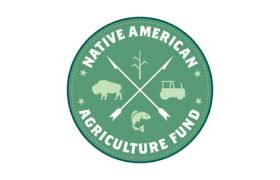The Native American Agriculture Fund (NAAF) is pleased to welcome three distinguished leaders to its Board of Trustees: Juanita Cole-Crasco, Zach Ducheneaux, and Jackson S. Brossy.

As fiduciaries of the Fund, NAAF trustees play a vital role in guiding its mission through strategic grant-making that supports agriculture in Tribal and rural communities. Cole-Crasco, Ducheneaux, and Brossy each bring deep expertise and lived experience as producers and advocates. Their leadership will help advance NAAF’s commitment to transforming agricultural finance and creating greater economic opportunity for Native producers.
- Juanita Cole-Crasco, Gros-Ventre Tribe- Crasco is a lifelong rancher, educator, and leader from the Fort Belknap Indian Reservation with over 40 years of experience in education, administration, and agriculture. She has written and secured millions in grants to support her community and has held leadership roles within her Tribe and across the state of Montana. A Keepseagle claimant and member of one of Montana’s largest Native ranching families, Crasco brings a critical perspective on NAAF’s responsibility to original claimants. Her deep understanding of the challenges and opportunities within agriculture and her expertise in fields where NAAF is looking to make an impact make her a trusted voice among NAAF's Board of Trustees.
- Zach Ducheneaux, Cheyenne River Sioux Tribe- Ducheneaux is a fourth-generation rancher and the founder of 5th C, a consultancy focused on community-based agricultural solutions. He previously served as Administrator of the USDA Farm Service Agency —he oversaw national agricultural policy and programs, including farm loans, conservation efforts, and disaster assistance. Before his time on FSA, he was the Executive Director of the Intertribal Agriculture Council. He continues to ranch with his family on the Cheyenne River Sioux Reservation and serves on the board of Project H3LP!, a nonprofit promoting youth development through horsemanship. Ducheneaux brings decades of experience in agriculture, policy, and economic growth. He has spent his career advocating for improved food systems, value-added agriculture, and responses to economic and social challenges facing Indian Country. His deep understanding of agriculture and commitment to producer success through capital-based solutions make him a valuable asset to NAAF’s mission.
- Jackson S. Brossy, Navajo Nation- Brossy is the Principal of Native Management Partners, LLC, and a recognized leader in economic development, specializing in access to capital and government contracting. He previously served as Assistant Administrator at the SBA’s Office of Native American Affairs and led the Native CDFI Network and the Navajo Nation Washington Office. An enrolled member of the Navajo Nation, he holds degrees from Stanford and Harvard Universities and currently serves on the boards of Change Labs and Prosperity Now. Brossy has worked to enhance access to capital and financial services for communities, including farmers and ranchers. Through his roles, he has advocated policies and programs that benefit agricultural enterprises, making him an impactful addition to NAAF.
“We are excited to welcome our new trustees, who each bring invaluable expertise and a profound commitment to uplifting agricultural communities,” Toni Stanger-McLaughlin, CEO of the Native American Agriculture Fund, said. “Their leadership will be instrumental as we continue to invest in transformative agricultural solutions, empower producers, and honor our commitment to the original Keepseagle claimants by ensuring their voices and needs are at the forefront of our mission.”
These new members join the most recent appointed members of the NAAF Board of Trustees, which include:
Aja K. DeCoteau, Citizen of the Yakama Nation- DeCoteau is the Executive Director of the Columbia River Inter-Tribal Fish Commission. She has over 20 years in natural resource management and policy and serves on the National Park System Advisory Board. Additionally, she contributes as an advisory board member for the Yale Center for Environmental Justice and holds board positions with Earthjustice and American Rivers.
Santana Nez-Coleman, Navajo Nation- An eighth-generation rancher from Arizona, Nez-Coleman earned her Doctor of Veterinary Medicine from the University of Arizona College of Veterinary Medicine. As a member of the inaugural cohort of the Tribal Agriculture Fellowship, she is committed to providing veterinary services to rural communities, blending traditional knowledge with modern animal health practices.
Both DeCoteau and Nez-Coleman exemplify the integration of Indigenous knowledge with contemporary expertise, driving progress in environmental stewardship and agricultural development within Native communities.
More Stories Like This
Native News Weekly (August 25, 2024): D.C. BriefsNavajo Nation Mourns the Passing of Former Vice President Rex Lee Jim
Deb Haaland Earns Endorsement From Communications Workers of America Local 7076
University Soccer Standout Leads by Example
Two Native Americans Named to Democratic Congressional Campaign Committee's“Red to Blue” Program
Help us defend tribal sovereignty.
At Native News Online, our mission is rooted in telling the stories that strengthen sovereignty and uplift Indigenous voices — not just at year’s end, but every single day.
Because of your generosity last year, we were able to keep our reporters on the ground in tribal communities, at national gatherings and in the halls of Congress — covering the issues that matter most to Indian Country: sovereignty, culture, education, health and economic opportunity.
That support sustained us through a tough year in 2025. Now, as we look to the year ahead, we need your help right now to ensure warrior journalism remains strong — reporting that defends tribal sovereignty, amplifies Native truth, and holds power accountable.
 The stakes couldn't be higher. Your support keeps Native voices heard, Native stories told and Native sovereignty defended.
The stakes couldn't be higher. Your support keeps Native voices heard, Native stories told and Native sovereignty defended.
Stand with Warrior Journalism today.
Levi Rickert (Potawatomi), Editor & Publisher


